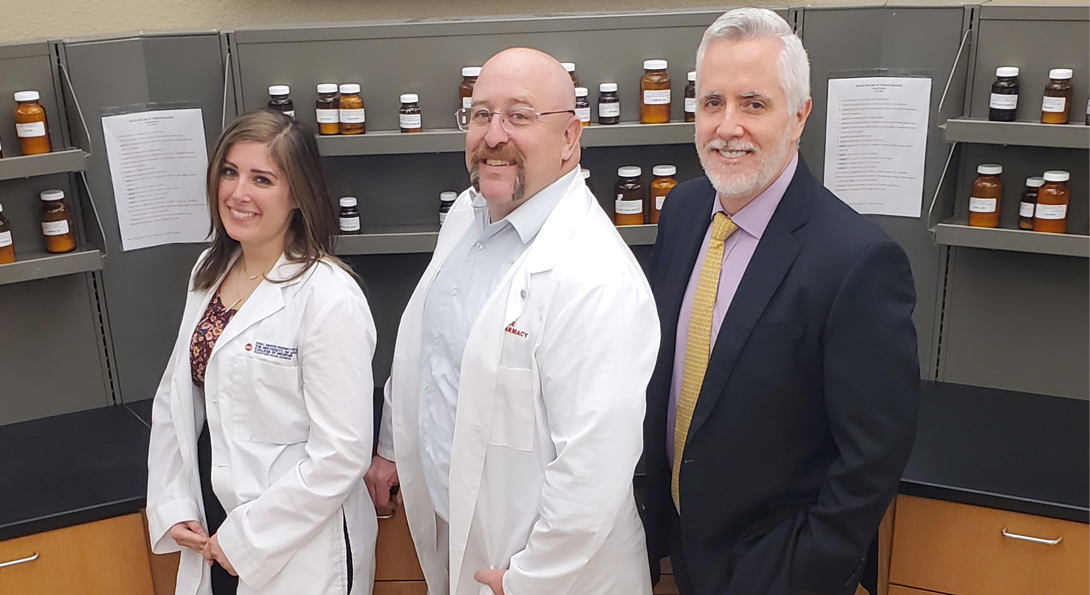Rockford Campus Set To Welcome First Pharmacy Resident

Introduction
Add a postgraduate residency to the ongoing maturation of the UIC College of Pharmacy’s Rockford regional campus.
Since the Rockford campus’s founding in 2010, the campus has consistently expanded its academic offerings, faculty roster, and community partnerships. With the launch of the campus’s first postgraduate residency this summer, the campus now celebrates yet another important step in its lively development.
“Our first PGY1 residency program represents the exciting growth of our Rockford campus and shows we’re eager to offer the high-quality advanced training opportunities needed in our profession and so valued at the UIC College of Pharmacy,” says Dr. Kevin Rynn (PharmD, RES ’93, FEL ’94), Rockford’s vice dean and an ardent champion of postgraduate training.
Leveraging affiliations with local hospitals, community health partners, and ambulatory care sites in both urban and rural settings across northern Illinois, the one-year PGY1 residency carries a decidedly ambulatory-based flavor. Residents will complete six required rotations in areas such as psychiatry, internal medicine, drug information, and family medicine in addition to five elective rotations aligned with their professional interests and career goals.
Residency program coordinator Dr. Annette Hays (PharmD ’16) says the PGY1 program, which includes exposure to numerous teaching opportunities and research experiences, was thoughtfully designed to develop clinical pharmacists prepared to offer medication-related care on multidisciplinary teams.
“We’re confident our PGY1 residents will leave us well positioned for a PGY2 residency or prepared to be independent practitioners,” Hays says.
Beyond preparing capable pharmacists for their next career steps, residency program director Dr. Chris Schriever (PharmD ’99, RES ’00, FEL ’02) sees additional benefits to the program’s debut. He believes the presence of a postgraduate residency heightens the credibility of the Rockford campus and will drive faculty development in practice, leadership, and management. Yet more, it lays the foundation for additional postgraduate training opportunities in Rockford.
“There’s so much good that can come from this, and that’s why we’re excited to have this PGY1 program in place,” Schriever says.
For a first-time residency program, Schriever and Hays say they were “exceptionally pleased” with the size and diversity of the applicant pool, which included prospects from multiple states in addition to those affiliated with UIC.
“We received more applicants than we ever envisioned,” Hays says, adding that she and Schriever sought “an independent, fast thinker” eager to learn and lead. “We looked for someone we felt could leave this residency and put their mark on the profession.”
On March 13, Rockford was matched with Dr. Alex Thorp. A recent graduate of the Medical College of Wisconsin, where he was a member of that institution’s first graduating class in pharmacy, Thorp is undaunted by being the Rockford campus’s resident trailblazer.
“Being the first is something I feel comfortable with, and especially so at UIC given what I’ve learned about the program and the people I’ve met,” says the Milwaukee-area native, who will begin his residency on July 1.
In investigating different PGY1 opportunities, Thorp says the Rockford residency intrigued him with its interprofessional nature as well as its diverse rotations.
“I didn’t see this variety elsewhere, and it’s something I thought would be beneficial to me in the long term,” says Thorp, who hopes his PGY1 experience in Rockford propels him into a PGY2 position and, eventually, professional work on interdisciplinary healthcare teams as well as a faculty position in academia. “I enter this residency confident it will put me in a position to succeed.”
UIC’s long history offering advanced clinical training opportunities opens doors
For more than four decades, the UIC College of Pharmacy has been training postgraduate pharmacists through a diverse collection of residencies and clinical research fellowships designed to spur professional success.
The college hosts PGY1 residencies in traditional pharmacy practice as well as first-year residencies for international students and those interested in community pharmacy. In addition, the college offers PGY2 residencies in 10 specialized areas, including pediatrics, critical care, oncology, and emergency medicine, as well as postgraduate research fellowships in areas such as infectious diseases, pharmacoeconomics, and academia and family medicine.
Led by recognized experts who regularly publish and speak on their research and practice specialties, UIC’s assorted postgraduate training programs expose pharmacists to innovative practice and research areas that ignite discovery and advance careers.
“Our programs enable trainees to see different professional paths they can take, many they might not have even known existed, and to learn from some of the very best minds in the field,” says Dr. Kirsten Ohler, director of the college’s PGY1 residency program.
Yet, UIC provides its dozens of postgraduate trainees a vibrant learning community. Ohler’s class of PGY1 pharmacy practice residents, for instance, routinely interact with and learn from clinical faculty, PGY2 residents, and fellows from various specialties.
“It creates a dynamic environment in which everyone is challenging each other to learn and answer the next great questions,” Ohler says, adding that UIC’s strong postgraduate training record enhances students’ marketplace credibility. “People know UIC trains good residents and fellows and that’s something our trainees capitalize on when they leave UIC and embark on their careers.”